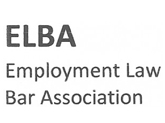Keith is a Barrister and Employment Lawyer who offers employer legal advice. He advises employers how to minimise the risks of being taken to an employment tribunal, and when litigation is the only option, how to successfully defend a claim.

Employment Law Advice for Employers – How Keith can help you:
1. He can defend you at a tribunal hearing.
2. Fire-fighting – He can help you to manage existing problematic situations with staff and avoid the legal pitfalls which could result in a claim being brought against you.
3. How to manage your business while minimising the risk of tribunal claims:
E.g.
- how to dismiss staff without creating a claim for unfair dismissal,
- performance management,
- managing sickness absence,
- reducing absence levels,
- making redundancies,
- setting up or buying a business including TUPE Regulations,
- checking existing contracts, procedures and policies,
Keith prides himself on providing clients with:
- Clear, no-nonsense, advice on the strength of your case
- A full explanation of your options, risks and prospects of success in Court
- Guidance through the Court process so you know when you need to make decisions and what will happen next
- Advice in plain English, not legal jargon
Recent Tribunal Cases W v A – For the Respondent – Unfair dismissal, Unlawful Deductions, Failure to pay holiday pay;
- C v C – For the Respondent – Unfair Dismissal, Sex Discrimination;
- G v R – For the Respondent – Whistle Blowing, Unfair Constructive Dismissal, Religious Discrimination;
- W v T & D – For both Respondents – Unfair dismissal, Breach of Contract.
Costs
Keith provides fixed fees for the work he undertakes, giving you complete control over your legal costs.
Research shows that with the right employer legal advice, employers can save up to 50% of the legal costs by going directly to a barrister rather than via a solicitor.
Call me on 0800 772 0791 or fill in the contact form.
Frequently Asked Questions
Can an employee appeal against the employer?
Nothing should stop an employee from making an appeal if he/she is not satisfied with the action taken by the employer. The appeal should be in writing, stating the employee’s grounds and reasons for the appeal. Employers should respond to the employee in writing, without unreasonable delay. An employee also has a statutory right to be accompanied by a colleague or union representative. A failure by an employer to resolve a grievance can, in certain circumstances, amount to constructive dismissal. If your employer has failed to resolve a grievance which is making your workplace intolerable for you, please contact me immediately and I will advise you of your options. If you think that your problems at work have not been resolved fairly or reasonably, please click
here to contact me.
Can you appeal against disciplinary procedures?
Generally speaking (as it depends on an individual’s circumstances), an employee may appeal against such disciplinary procedures if he/she believes that:
- The decision was wrong.
- Unfair procedures were used.
- The punishment is too harsh.
- New evidence has come to light.
There are other unforeseen circumstances. An employee cannot make an Employment Tribunal claim against a warning, or disciplinary procedures reached, although an employee could claim constructive dismissal if the conduct of his/her employer forces him/her to leave. There is also an alternative approach to this, which is to suggest mediation.
What are Disciplinary procedures?
Disciplinary procedures are used by employers to tell employees that their performance or conduct isn’t up to the expected standard. Employers should always bear in mind principles of fairness when applying any disciplinary procedures. If an employee has been subjected to disciplinary procedures, it is the right of the employee to have a clear and informed decision on all the allegations made against him/her, together with supporting evidence. The employee should also be given the opportunity within a reasonable time frame to challenge the allegations before such decisions have been reached. If an employer decides to go ahead with the sanctioning of such disciplinary procedures, the employee should be given the right to appeal against it.
What are the various forms of discrimination?
Some kinds of discrimination are perfectly legal. For example, it is not illegal to discriminate against people who are overweight or who support a different football team to you. However oranges are not the only fruit. Discrimination on any of the following characteristics is illegal under the Equality Act 2010.
- Age
- Race
- Gender / Sex / Sexual orientation.
- Religion
- Disability
What is a direct access barrister and does it benefit me?
It is now possible to go directly to a barrister for advice or representation without having to go through a solicitor – which was the only way for several hundred years. The new approach is known as ‘direct access’ or ‘public access’ and it is available in both civil and criminal cases.
The first advantage of instructing a barrister direct is that you will save the cost of having a solicitor prepare a brief for the barrister. You may also, with the advice the barrister gives you, be able to correspond with the other party directly yourself – again saving the costs of solicitors’ letters.
Secondly, when instructing a barrister direct, much of the work that would normally be done by a solicitor, such as collating documents and photocopying, will be done by you. Which means more cost savings.
It has been estimated that clients who come direct to barristers can save between 50% and 60% of their legal costs in suitable civil and criminal matters.
By going direct you may also find that the job is done quicker, and that you have more control over your case.







